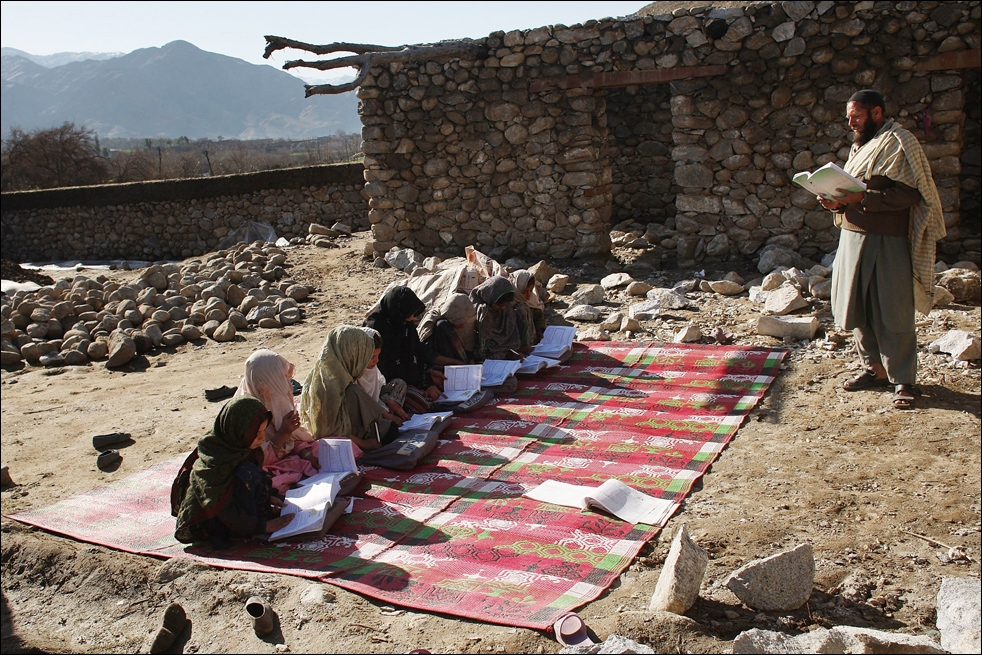http://jpstillwater.blogspot.com/2010/11/afghans-still-on-edge-of-extinction-its.html
It’s hard to write about Afghanistan with any kind of accuracy because only approximately 7% of Americans even actually know where the freaking place is — let alone know anything about what is actually going on there. I mean seriously. How many of us have taken the time to read about Afghanistan in WikiLeaks or even USA Today? And how many of us have even actually been there? It’s not as if Afghanistan was Hawaii or Cancun.
But I still want to write about Afghanistan anyway — even if it does mean having to do some actual research. But why would I want to do that? Easy answer there — because most of the taxes that Americans pay will eventually end up in Afghanistan, not Cancun. So let’s follow the money.
According to journalist Tom Engelhardt, “While Americans fight bitterly over whether the stimulus package for the domestic economy was too large or too small, few in the U.S. even notice that the American stimulus package in Kabul, Islamabad, Baghdad, and elsewhere in our embattled Raj is going great guns. Embassies the size of pyramids are still being built; military bases to stagger the imagination continue to be constructed; and nowhere, not even in Iraq, is it clear that Washington is committed to packing up its tents, abandoning its billion-dollar monuments, and coming home.”
And just exactly how is this huge tax investment in Afghanistan going? According to journalist Jeremy Scahill, it’s not going so good. “The US killing of civilians, combined with a widely held perception that the Afghan government exists only for facilitating the corruption of powerful warlords, drug dealers and war criminals, is producing a situation in which the Taliban and the Haqqani network are gaining support from the Pashtun heartland in communities that would not otherwise be backing them.” Good grief. No wonder nobody in America seems to want to know anything about what is happening in Afghanistan. It’s all just one big mess of bad news!
And, according to the Washington Post, even Afghanistan’s president is pissed off at the huge U.S. military presence there. “Karzai has long been publicly critical of civilian casualties at the hands of U.S. and NATO troops and has repeatedly called for curtailing night raids into Afghan homes. Under Petraeus and his predecessor, such raids by U.S. Special Operations troops have increased sharply, to about 200 a month, or six times the number being carried out 18 months ago, said a senior NATO military official, who requested anonymity so that he could speak candidly about the situation. These operations capture or kill their target 50 to 60 percent of the time, the official said.” That’s a whole freaking bunch of dead Afghans.
“Karzai said that he wanted American troops off the roads and out of Afghan homes,” WaPo continued, “and that the long-term presence of so many foreign soldiers would only worsen the war. His comments placed him at odds with U.S. commander Gen. David H. Petraeus, who has made capture-and-kill missions a central component of his counterinsurgency strategy, and who claims the 30,000 new troops have made substantial progress in beating back the insurgency.” http://www.washingtonpost.com/wp-dyn/content/article/2010/11/13/AR2010111304001.html?sid=ST2010111305091
 But I did manage to locate some good news as well. Apparently if you can’t find a job in America, you can always get a hot new job in Afghanistan, working with the US/AID. Check this out. “Looking for a challenge? The U.S. Agency for International Development (USAID) is actively recruiting experienced officers to serve in Afghanistan. These are non-career Foreign Service Limited Appointments, for up to five years, requiring: Eight years of relevant experience, four of which must be overseas; Bachelor’s degree or higher; U.S. citizenship.” http://www.usaid.gov/locations/asia/countries/afghanistan/opportunities.html. And did you notice that bit about America (and you) staying there for the next five years? So much for a quick end to that war.
But I did manage to locate some good news as well. Apparently if you can’t find a job in America, you can always get a hot new job in Afghanistan, working with the US/AID. Check this out. “Looking for a challenge? The U.S. Agency for International Development (USAID) is actively recruiting experienced officers to serve in Afghanistan. These are non-career Foreign Service Limited Appointments, for up to five years, requiring: Eight years of relevant experience, four of which must be overseas; Bachelor’s degree or higher; U.S. citizenship.” http://www.usaid.gov/locations/asia/countries/afghanistan/opportunities.html. And did you notice that bit about America (and you) staying there for the next five years? So much for a quick end to that war.
“There are about 100,000 U.S. troops in Afghanistan [as of November 2010],” the Washington Post also tells us. Talk about your job opportunities!
Next I read a book called “My Forbidden Face,” published back before Bush and Cheney started bombing the crap out of Afghanistan — back when the original “Taliban” were still in power in Kabul. Writing under the pseudonym of “Latifa,” its author vividly described how the Taliban back in the 1990s basically tried to kill off all Afghan women — and apparently they almost succeeded too. The Taliban imprisoned women in their homes, beat them with steel-tipped whips, hung them on gibbets in public, deprived them of all medical care, took away their jobs, starved them, raped them, mutilated them and did everything else that they possible could to make Afghan women extinct. Obviously the Taliban were not thinking ahead!
Without women to give birth to the next generation, all Afghans (not just Afghan women) faced the danger of becoming extinct.
And then the book’s author suggests that these brutal 1990s Taliban had been sponsored and financed by Pakistan — and that in fact many of the Taliban were even Pakistanis themselves.
Pakistan’s connection with the Taliban then got me to wondering how a small country like Pakistan could even afford to mount such an expensive campaign. The answer to that question lies in Washington too. I betcha dollars to donuts that most of the money to train and support Talibs was pulled out of Pakistan’s deep pockets — pockets stuffed with American military aid.
And apparently, unlike the Taliban, Pakistan WAS thinking ahead. “Without all those pesky Afghans standing around and mucking it all up, the wealth of Afghanistan would be ours for the taking!” they apparently said to themselves — and started out on a campaign to annihilate Afghans in the above-stated manner, whether they were women or men (or even children). Then as more and more Afghans died, Pakistan happily started putting its plan into action by seizing Afghan land next to their border, the area we now call “Af-Pak”. Yeah right.
“But Jane,” you might ask, “how does what happened back in the 1990s pertain to what is happening in Afghanistan today?” Good question. And since I couldn’t find an answer to that question anywhere else in my reading explorations, I’m going to have to make this one up. Here it is:
“If Pakistan thought it was such a hot idea to sponsor the Taliban before, then isn’t it likely that they are probably sponsoring them again now?” Pakistan’s ploy to seize Afghan land worked for them before — so why change policy in mid-stream?
And what else has my research taught me? Hmmm. First Genghis Khan killed Afghans. Then the British killed Afghans. Then the Soviets and the Americans took turns killing Afghans. Then the Mujahideen killed Afghans. Then the Taliban killed Afghans. And Pakistanis killed Afghans. And Afghans themselves even obliged by killing themselves. And now the Americans (and their allies from Europe and Canada) have jumped back into this highly-popular hot game called “Let’s kill us some Afghans”.
But WHY are people from all over the freaking world so completely intent on killing Afghans? I clearly don’t understand this. How come all of the players in this bloody game seem to be trying their level best to force Afghans into extinction? And you thought that the polar bears had it hard!
According to Jeremy Scahill, “The US strategy seems to be to force the Taliban to the table through a fierce killing campaign. According to the US military, over a ninety-day period this past summer, US and coalition Special Operations Forces killed or captured more than 2,900 ‘insurgents,’ with an estimated dozen killed a day.”
And if this new insurgence of the Taliban is being sponsored by Pakistan too like the old one apparently was, wouldn’t it make sense to cut off all U.S. military aid to Pakistan and thus cut off this hydra at its head?
But what if all U.S. military aid to Pakistan was to be suddenly cut off and Pakistan was then summarily forced to stop back-dooring funds and money to the Taliban — and as a result America finally began to get the upper hand in Kandahar and Helmand and finally started to win the longest freaking war in American history?
But even if America does win its war against the Taliban (be they old or new) it will once again be the Afghans themselves (both men and women) who will lose because their country will still be occupied by Americans — and the Afghans, like the polar bears, will still be in danger of extinction.
And even if Washington does finally win this unwinable “war,” would that mean that Americans would finally pack up their occupation and go home? Apparently not. Apparently Afghanistan also serves as a buffer zone of influence between Russia, India, China and lord knows who else. Will Washington ever give up the Khyber Pass and the Oil (formerly Silk) Road? Not bloody likely.
I guess the main thing that I have learned from my research so far is that while everyone in the freaking world seems to be warring over this particular piece of the turf, it is the average Afghan who suffers.
PS: Here’s just one last piece of research that I did — running this essay past a friend of mine who is an expert on Afghanistan. And here’s his reply: “I don’t see any glaring errors per se in this article, Jane, but you might want to let readers know early on that while Latifa’s position might appeal to many Americans who still buy into the ‘Great White Saviors of Helpless Brown Women for Savage Brown Men’ concept because it is rather erotic and therefore difficult to unseat because it does not reside in the cerebrum but rather somewhere in the limbic system or reproductive glands, the same horrible things were being done to Afghan men as well as Afghan women during that time.” Got it.
“And here are some further points your readers might not know about the 1990s Taliban: First, the Taliban beat both men and women because they were focused on physical means of public discipline as a way of maintaining control — using techniques like those used by the Romans (and most historic cultures).
“Second, the Taliban were trying to restore order to a very chaotic situation. Before the Taliban rose to power, the U.S., Pakistan, the Saudis and the Iranians had all funded the mujahideen overthrow of the Najibullah regime, but the result by April 1992 was violent chaos. And the Taliban did succeed in restoring order where, since 2002, the combined U.S., ISAF and Afghan forces have failed to do so. Evidence: The Taliban could and did ban opium production in 2000.
“But while my comments mainly reinforce your points, those little factoids might still be a surprise, alas.” Yes, and it is also a surprise to me that the human race still hasn’t learned a better way to resolve conflicts than to resort to the old Roman (and caveman) tactics of violence and killing.
PPS: When I was in Kabul a few years ago, I met a whole bunch of REALLY NICE Afghans — which has made me painfully aware that, right at this very moment, Americans, Canadians, the Taliban, Pakistanis, NATO forces, etc. aren’t just over there killing anonymous and nameless “Afghans”. They are killing real people who have families just like you and me and who are hard-working people who bleed when you hurt them and who are NICE. And some of them are my friends.
In her recent book, “Peace Meals: Candy-Wrapped Kalashnikovs and Other War Stories,” journalist Anna Badkhen writes about the real people, the innocent bystanders in Afghanistan who get killed in its wars. “We often dismiss the peopled landscapes of Afghanistan—and Iraq and Kashmir, Chechnya and Somalia—as merely a sere battleground of the global war against Islamist terrorism. We erect an emotional wall between ourselves and the millions of nameless, two-dimensional figures that move across our television screens, foreign and strange, almost cartoon-like, unsung. One goes up. One goes down. We switch to a different channel.”
I met Badkhen once at Camp Victory in Iraq, when we were roommates at Camp Victory’s can city. Ever resourceful, she loaned me some masking tape so that I could repair a broken shoe strap. She just looked just too young and innocent to be a hardened war veteran — but she was.
Badkhen states that, between when the U.S. started keeping records in 2007 and the publication of her book, 7,324 Afghan civilians had died in the war. And a whole lot more of them have died due to lack of medical facilities, etc. “One in eight Afghan women dies during childbirth. One in four children dies before the age of 5, mostly of waterborne diseases. Only a third of Afghans have access to clean drinking water; fewer than one in 10 have access to sanitation facilities. Life expectancy, both for men and women, is 44 years.” Yet no one ever tallies these deaths that are directly related to war.
“‘Peace Meals’ is a tribute to all my host families who live, and perish, on the edges of the world. It is my invitation to connect with the ordinary people trapped in mass violence of the last decade in Afghanistan, Iraq and elsewhere in the Middle East and in East Africa; to break bread with them; and to peer past the looking glass of warfare led or backed by the United States into the lives of the people who, despite the violence and privation that kill their loved ones and decimate their towns, somehow, persevere. Even if they are not mentioned in the daily news feed, they have names.” http://www.truthdig.com/arts_culture/item/peace_meals_breaking_bread_with_wars_forgotten_families_20101104/
PPPPS: Afghans aren’t the only ones getting killed over there. Americans are too. Journalist David Pratt has this to say about that: “…More recently, just a few weeks ago in fact, I met a 22-year-old British marine called Ryan Gorman in Helmand, Afghanistan. As a sniper with 45 Commando, his mental snapshots were of a different kind. ‘Lots of the lads here when they fire back are shooting at shapes and blurs, but I could draw you a picture of the men I see, even the features on their faces.’ Being a sniper is not something Gorman likes to talk about when back home in East Kilbride. ‘Even my closest mates wouldn’t understand,’ he confides.” Me neither.
“But then just who,” Pratt points out, “other than soldiers themselves, could ever be expected to understand such experiences? How many of us can honestly relate to what it must be like to watch a close friend die horribly in battle, or carry the psychological weight of having ‘confirmed kills’ attributed to you?” http://www.heraldscotland.com/understanding-generation-kill-1.830158
Who indeed?


[…] This post was mentioned on Twitter by Googlyfish Jobs USA and CF News Wire, Michael Stryder. Michael Stryder said: Afghanistan: Still on the Edge of Extinction http://bit.ly/gv9EOw […]
Jane, there are several points on which I probably diverge with you.
First, of course, I’m not an American, and I live, geographically speaking, not all that far from Afghanistan. I’ve met many Afghans, including Pashtuns and Tajiks, and at least one woman who survived the Taliban occupation from beginning to “end”.
In the first place, you are probably confusing the mujahideen with the Taliban, a mistake made by maybe 95% of Americans I’ve heard speak on the subject. The Taliban did horrible things in restricting the liberties of Afghan women, but they were not those who raped at gunpoint or killed women for the fun of it. The Taliban movement was basically a reaction to the horrible mujahideen who were, of course, armed and trained and cosseted by the CIA; and it was the mujahideen who shelled Kabul and abducted and mutilated women.
I have this fundamental problem with believing these books by what amounts to be defectors. They have a vested and very basic interest in exaggerating the hardships and evil of the regime they escaped, and they always have sympathetic ears willing to listen, and gullible throats to swallow their tales hook line and sinker. It’s not that I’m saying the lady you are quoting is a liar; I’m just saying I wouldn’t believe anything she says without some kind of corroborative evidence.
The medical care thing, for instance; the Taliban didn’t forbid medical care, they just made it compulsory for women to attend women-only hospitals and be treated by women doctors only. In practice, after decades of destruction and emigration, there were precious few hospitals and women doctors to go around, let alone anaesthetics or medicines; and guess who would get the lion’s share of those? (Anyone in South Asia would tell you that males will always get the best of what’s available, anywhere.)
Also, the Pakistani Pashtuns have a long history of trying to secede from Pakistan and to join the Afghan Pashtuns in a new nation, Pakhtunkhwa. Pakistan’s interest in Afghanistan is very basic; it wants a sympathetic, and controllable, government in power there which won’t rouse up its own Pashtuns in rebellion, and which will allow Pakistan territorial depth in case of a war with India.
I’ll have to admit i find the reasons for committing atrocious acts of violence against the Afghanistan people every bit as confusing as any act of aggression taken by the western world against the mid-east. Invasion serves only one purpose; to take away something of value from the people indigenous to that country. The values we are talking about are not just contained in natural resources; in this case oil and poppy fields. It removes the rights of the inhabitants of the area to their culture, their language, their customs, their individual beliefs, and self determination. All the reasons in the world for continuing the occupation of Afghanistan is nothing more than smoke and mirrors.
I did, however, find your paragraph on civilian hire for work in Afghanistan very interesting. I wrote an article a few months back, at http://subversify.com/2010/09/24/reclaiming-the-throw-away-citizen/
that centered around civilian workers as the newest target for Afghanistan invasion resistance movement. For the last two years, the number of civilian casualties have outstripped the number of military deaths. This trend is expected to continue as corporations have discovered it’s cheaper to supply workers now, then to continuously resupply the ranks of the military, who require training, guns, ammunition, heavy armor vehicles and have a more secure insurance coverage than the questionable practices of overseas insurance for civilian workers and the resistance adamantly wants to drive home the experiences involved with the pain and loss of civilian death.
America has insulated itself against pain and suffering. What is unpleasant is shoved aside for prescription pills and cheap home entertainment. What is tragic and unnecessary is quickly forgotten for the sake of convenience. America forgives itself easily, forgiving all its wrongful actions for a belief that sacrifices are necessary to save our economy. In doing so, it also sacrifices its humanity, and that is why as a civilized nation, it has begun to fail.
This Wikileaks thing is troubling. Every country has the right to keep it’s secrets. This Julian guy clearly has a vendetta against the U.S.. He’s an Austrailian right? Would he like to see all of that nation’s secrets spilled out in the open? There is no country in the world that doesn’t have state secrets. What about national defense? One thing that is being overlooked is that sometimes such secrets help to avoid war. Did Assange ever think of that? No….he’s looking to embarass the U.S. and make a name for himself. I think his 15 minutes of fame will be over soon enough.
Wikileaks’ Julian Assange has declared he’s going after a bank – don’t expect him to live much longer.
Clifford: There is a difference between state secrets and what Wikileaks is doing. And as for “embarrassing” the US, nothing Wikileaks does can do as much to achieve that (very laudable) aim as what the US is doing to itself.